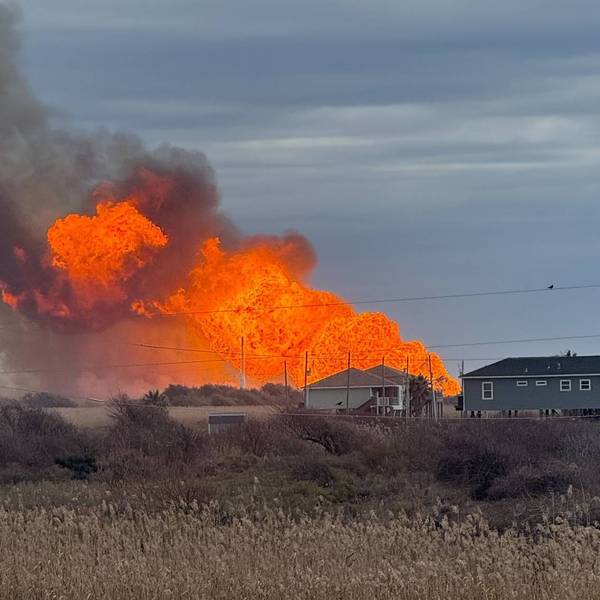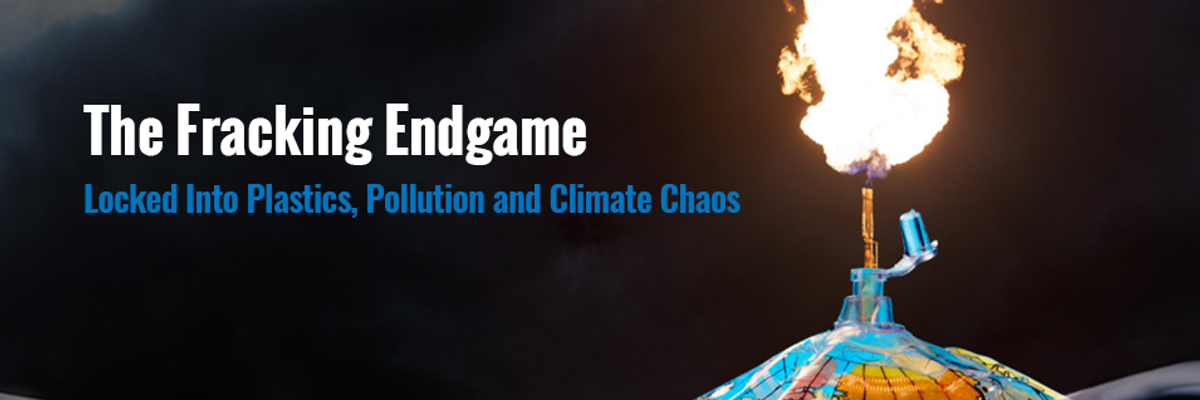A first-of-its-kind report released Wednesday by Food & Water Watch details the more than 700 new U.S. facilities that have been recently built or proposed for development "to capitalize off of a glut of cheap fracked gas," and the consequences for the planet and its inhabitants if these projects are allowed to continue.
"This new analysis paints a devastating picture of what our world will look like if fracking and fossil fuel infrastructure buildout aren't halted soon."
--Dr. Sandra Steingraber, biologist and activist
The report comes a week after top Energy Department officials, in a press release about natural gas exports, referred to fossil fuels as "molecules of U.S. freedom" and "freedom gas." Climate campaigners characterized that widely ridiculed language as just another example of the Trump administration's demonstrated commitment to planetary destruction.
"The Trump administration calls it 'freedom gas,' but what we're really talking about here is failure gas," Food & Water Watch's Seth Gladstone told Common Dreams about the report. "Continuing to invest in fracked gas would represent a failure to address plastics pollution, a failure to prioritize human health and safety, and a failure to protect future generations from climate chaos."
Fracking, or hydraulic fracturing, has raised concerns about public health in nearby communities--numerous studies have tied fracking to frequent hospitalizations for genital, skin, and urinary conditions as well as increased rates of asthma, cancer, and motor vehicle fatalities. But the concerns don't end there.
"These projects aren't just associated with health and safety risks: if even a fraction of them come to fruition, they will condemn the planet to a future of climate chaos," Food & Water Watch executive director Wenonah Hauter warns in the foreward of the report.
Reflecting on what research on fracking has revealed in recent years, Hauter writes: "Natural gas, touted as a 'bridge fuel' to a clean energy future, was actually helping to tip the scales of climate stability past the point of no return. Fracked gas was found to be a climate killer."
The group's new report--entitled Fracking Endgame: Locked Into Plastics, Pollution, and Climate Chaos (pdf)--focuses on three key industries that are both benefiting from and helping to drive the country's fracking boom: "the petrochemical and plastics industries that use natural gas liquids as a key feedstock for their manufacturing; gas exporters building liquefied natural gas (LNG) terminals to ship gas overseas; and natural gas-fired power plants."
"This new analysis paints a devastating picture of what our world will look like if fracking and fossil fuel infrastructure buildout aren't halted soon. But the damage to our bodies is already happening," Dr. Sandra Steingraber, a biologist, environmental activist, and author, said in a statement. "It needs to stop now."
Fracking Endgame breaks down how each of these industries forms "a symbiotically profitable business alliance with the fracking industry," and how they are rapidly expanding, with hundreds of projects recently completed or in the pipeline:
- Proliferation of plastics plants to capitalize on fracking: Industry experts project that the plastics industry will have added 28 million tons of plastic production between 2011 and 2020, and more than $202 billion is slated to be invested in 333 new facilities and expansions to take advantage of fracked gas, including 20 ethylene crackers to turn shale gas into feedstock for plastics manufacturing plants
- Pushing natural gas exports to raise domestic prices: The industry and the Trump administration are promoting LNG exports to reduce the domestic gas supply and raise U.S. natural gas prices. In 2018, there were only three active LNG export facilities in the contiguous United States, but 22 more were either already being built or were approved for construction, and another 22 were pending federal review.
- Wave of new fracked gas-fired power plants: The power industry has 364 new gas-fired power plants under development for 2018 to 2022, and gas deliveries to power plants rose 57 percent between 2006 (before the fracking boom) and 2017. The gas-fired generation capacity from plants added in 2017 and 2018 alone could power 24 million U.S. households, an expansion that is creating a power surplus in some areas.
U.S. exporters of fracked gas, the report points out, rely in part on political allies--both in Congress and the Trump administration.
Food & Water Watch was among the more than 200 groups that sounded the alarm last month over federal legislation--which has passed the House but still lacks Senate approval--that would provide billions of dollars in support for natural gas infrastructure projects and, critics warn, lock "both the United States and Europe into decades of continued fossil fuel dependence under the guise of national security."
"The Trump administration calls it 'freedom gas,' but what we're really talking about here is failure gas."
--Seth Gladstone, Food & Water Watch
The report outlines how "the Trump administration has been pushing exports by trying to rush the approvals of new LNG export facilities," from Energy Secretary Rick Perry--who once claimed "my job is to sell a lot of [LNG] around the world" and labeled opposition to fossil fuels "immoral"--to Gary Cohn, the president's then-top economic adviser, who in 2017 demanded a new review of the proposed Jordan Cove LNG export terminal, even though the Federal Energy Regulatory Commission had rejected the Oregon project the previous year.
"What we see in this report is the industry blueprint for ensuring decades more of fossil fuel dominance over our society. If it becomes realized, the endgame would be a scary, dangerous world of omnipresent plastic waste, expanding air and water pollution, unacceptable health impacts and irreversible climate chaos," Hauter said in a statement. "The solution is simple: We must cut off this filthy production stream at its source, by banning fracking and halting the runaway buildout of fracked gas infrastructure that is spreading like a toxic web all over the country."




